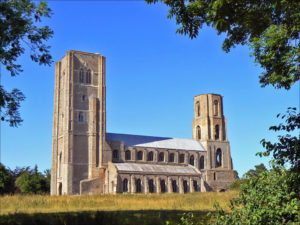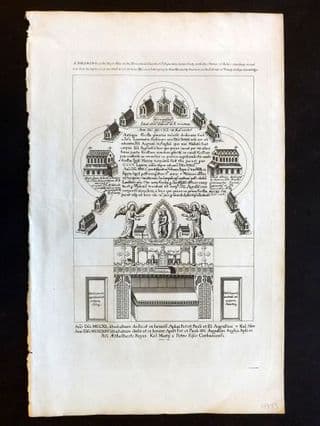Christopher Howse in his Sacred Mysteries column in today’s Daily Telegraph writes about the wonderful reredos designed in 1913 by the architect and designer Sir Ninian Comper (1864-1960) for Wymondham Abbey in Norfolk. Dedicated as a War Memorial in 1921 the gilding was not completed until 1934.
Wikipedia has an history of the monastic foundation and of the church - including a good photograph of the reredos - at Wymondham Abbey and also a life of the designer at Ninian Comper
Wymondham Abbey from the south west
Image: Number10theabbey.co.uk
The western tower, parochial nave and the shell of the central tower is all that survives of what was a sizeable priory of St Albans Abbey, and well worth seeing for its Norman and later medieval architecture. However what does make a visit to Wymondham special, as Christopher Howse found recently and as I did with my mother in 1970, is Comper’s recreation of a late medieval reredos. This is undoubtedly a piece designed for Christian worship as it ought to be.

Wymondham Abbey Reredos
Image: Wymondham Abbey
Howse sees its source in the Islip Roll depicting the High Altar of Westminster Abbey at the beginning of the sixteenth century. Whilst that may well be true it is also very much in the tradition of the altar screens at Winchester, St Albans and Southwark from the same period and the rather earlier college chapels at New, All Souls and, later, Magdalen in Oxford. The interconnected relations of founders and patrons and the see of Winchester make these something of a family or group.
Another source must surely have been the well-known medieval drawing of the High Altar of St Augustine’s Abbey in Canterbury which shows a figure of Christ enthroned in a mandorla - indicating the Two Natures - as Comper recreated at Wymondham.
Engraving circa 1790 from Hasted’s Kent of the medieval drawing of St Augustine’s High Altar and reliquaries
Image: albion-prints.com
Howse’s article can be read at Sacred Mysteries: Breathtaking splendour of Gothic blue and gold
I do have to sadly agree with Christopher Howse that one cannot really see such a work being commissioned today. Far too many historic cathedrals and churches have been beguiled into installing curious creations in metal and other materials conceived by a local technical college lecturer that are, we are told, “relevant”.
I am sure there are still the designers and craftsmen to create work like that of Comper, but where are the patrons with the taste and discernment to commission them?




1 comment:
Dear John.
Many thanks, indeed, for this riveting and absorbing Article on “The Comper Reredos at Wymondham”. Much new information was forthcoming from your excellent Article.
For information, Zephyrinus also previously Posted on Sir Ninian Comper. The following Articles might be of interest to you, John, and also your Readers.
https://zephyrinus-zephyrinus.blogspot.com/2016/11/saint-mary-virgin-church-designed-by.html
https://zephyrinus-zephyrinus.blogspot.com/2015/09/the-church-of-our-lady-and-saint-thomas.html
Post a Comment